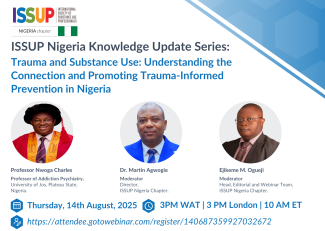ISSUP Nigeria Knowledge Update Series (28th Session): Trauma and Substance Use: Understanding the Connection and Promoting Trauma-Informed Prevention in Nigeria

ISSUP Nigeria would like to invite you to the 28th session of its bi-monthly webinar in the Knowledge Update Series. This webinar will focus on the topic of 'Understanding the Connection and Promoting Trauma-Informed Prevention in Nigeria'.
Date: 14th August, 2025
Time: 3:00 PM WAT | 3:00 PM London | 10 AM ET
This webinar examines the complex link between trauma and substance use, with a focus on the Nigerian context. It will explore how experiences such as sexual, physical and emotional abuse, along with wider forms of societal violence, can drive substance use as a maladaptive coping mechanism. The session highlights the importance of trauma-informed prevention and intervention strategies that are culturally grounded, family-centred and responsive to Nigeria's social and political landscape. Participants will explore:
- The complex interplay between trauma and substance use
- Types of trauma (acute, chronic, complex) and their impact on mental health
- Substance use as a maladaptive emotional coping mechanism
- Neurobiological pathways linking trauma and addiction
- Co-occurring disorders (trauma and substance use) and treatment complexities
- The Quadrants of Care and Recovery Capital framework
- Prevention strategies, early interventions, and healthy emotional coping
- Contextualising trauma in Nigeria (colonialism, conflict, gender-based violence, poverty, etc.)
Discussion Topics:
- In what ways do trauma and substance use intersect within the Nigerian context?
- What trauma-related emotional responses often contribute to substance use disorders?
- How do different types of trauma (acute, chronic and complex) affect the risk of substance use?
- How can clinicians and families recognise signs of trauma-driven substance use?
- What trauma-informed strategies are most effective in preventing addiction?
- How can community-based interventions reduce exposure to environmental triggers?
- In what ways does “recovery capital” influence the success of treatment and long-term recovery?
- How do cultural beliefs and stigma shape responses to trauma and substance use?
Relevance and Significance:
-
The concept of trauma is endemic in Nigeria. There are the relics of colonization and slave trade with the story telling which has left an intergenerational trauma. The concept of female genital mutilation is an indelible trauma on multitudes of women in Nigeria. The story of ethnoreligious conflicts, terrorist groups, herdsmen attacks and such likes are daily headlines in Nigeria. As a consequence, many Nigerians are traumatized.
Learning about the relationship between trauma and substance use will help practitioners process their own trauma and also be able to handle that of their clients. Healing from trauma is necessary in preventing substance use in the society. This discourse will in a small measure begin the discourse on the persistent trauma in Nigeria and its implication for substance use.
Target Audience:
- Public health professionals, addiction counsellors, practitioners, policymakers, and community leaders, ISSUP members.
Learning Outcomes:
Following this webinar, participants will be able to:
-
Gain an understanding of the relationship between trauma and substance use.
-
Learn about the biological factors contributing to high substance use among trauma victims.
-
Explore coping mechanisms, with a focus on emotional coping strategies.
-
Be introduced to the quadrants of care.
-
Engage in a discussion on preventive measures for trauma and substance use.
Presenter:
Professor Nwoga Charles
Professor Nwoga Charles is a Professor of Addiction Psychiatry at the University of Jos, Nigeria, and a Consultant Psychiatrist at Jos University Teaching Hospital. With over a decade of experience in clinical practice and academia, he is a global trainer with UNODC in Drug Demand Reduction and a national trainer for the Universal Treatment Curriculum under the Colombo Plan.
He has worked closely with Professor Moses D. Audu and has contributed to training, treatment, and research in substance use disorders. Prof. Nwoga also provides voluntary consultancy at Serenity and Wellbeing Healthcare Centre and Quintessential Healthcare Centre—UNODC-accredited facilities in Nigeria.
His work focuses on integrating culturally grounded, community-based approaches to reduce stigma and treatment costs. He is a member of several professional bodies, including the International Society of Substance Use Professionals (ISSUP).
Moderators:
Dr. Martin O. Agwogie
Director, ISSUP Nigeria Chapter
Ejikeme M. Ogueji
Head, Editorial and Webinar Team, ISSUP Nigeria Chapter
References:
-
American Psychiatric Association. Diagnostic and Statistical Manual of Mental Disorders (5th ed.). Arlington, VA: American Psychiatric Association; 2013.
-
Kessler RC, Sonnega A, Bromet E, Hughes M, Nelson CB. Posttraumatic stress disorder in the National Comorbidity Survey. Archives of General Psychiatry. 1995;52(12):1048–1060.
-
Khantzian EJ. The self-medication hypothesis of addictive disorders: focus on heroin and cocaine dependence. American Journal of Psychiatry. 1985;142(11):1259–1264.
-
Ouimette P, Brown PJ, Najavits LM. Course and treatment of patients with both substance use and posttraumatic stress disorders. Addictive Behaviors. 1998;23(6):785–795.
-
Jacobsen LK, Southwick SM, Kosten TR. Substance use disorders in patients with posttraumatic stress disorder: a review of the literature. American Journal of Psychiatry. 2001;158(8):1184–1190.
-
Dube SR, Felitti VJ, Dong M, Chapman DP, Giles WH, Anda RF. Childhood abuse, neglect, and household dysfunction and the risk of illicit drug use: the adverse childhood experiences study. Pediatrics. 2003;111(3):564–572.
-
Koob GF, Volkow ND. Neurobiology of addiction: a neurocircuitry analysis. The Lancet Psychiatry. 2016;3(8):760–773.
Webinars and online events delivered and hosted by the International Society of Substance Use Professionals (ISSUP) are provided for informational purposes only. They are educational in nature and do not constitute medical advice, diagnosis or treatment.
